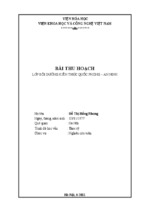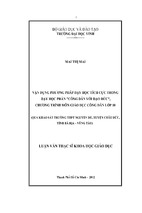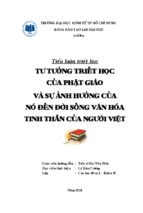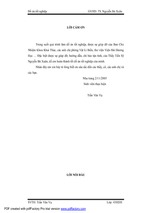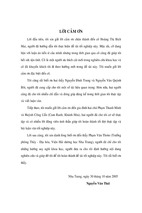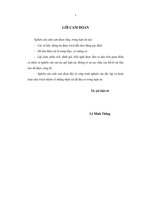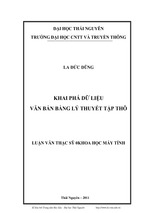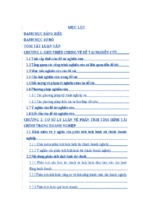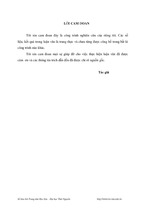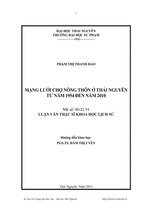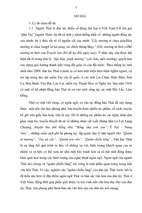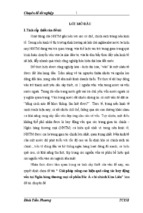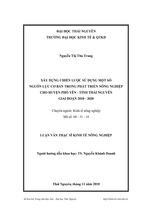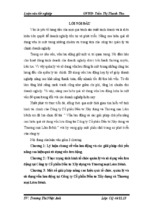BỘ GIÁO DỤC VÀ ĐÀO TẠO
TRƯỜNG ĐẠI HỌC QUẢN LÝ VÀ CÔNG NGHỆ HẢI PHÒNG
-------------------------------
ISO 9001:2015
KHÓA LUẬN TỐT NGHIỆP
NGÀNH: NGÔN NGỮ ANH
Sinh viên
: Nguyễn Xuân Minh
Giảng viên hướng dẫn: ThS. Bùi Thị Mai Anh
HẢI PHÒNG 01– 2021
BỘ GIÁO DỤC VÀ ĐÀO TẠO
TRƯỜNG ĐẠI HỌC QUẢN LÝ VÀ CÔNG NGHỆ HẢI PHÒNG
-----------------------------------
EFFECTIVE METHODS TO IMPROVE SPEAKING
SKILL FOR ENGLISH MAJOR FRESHMEN AT HAI
PHONG TECHNOLOGY & MANAGEMENT
UNIVERSITY
KHÓA LUẬN TỐT NGHIỆP ĐẠI HỌC HỆ CHÍNH QUY
NGÀNH: NGÔN NGỮ ANH
Sinh viên
: Nguyễn Xuân Minh
Giảng viên hướng dẫn: ThS. Bùi Thị Mai Anh
HẢI PHÒNG 01 – 2021
BỘ GIÁO DỤC VÀ ĐÀO TẠO
TRƯỜNG ĐẠI HỌC QUẢN LÝ VÀ CÔNG NGHỆ HẢI PHÒNG
--------------------------------------
NHIỆM VỤ ĐỀ TÀI TỐT NGHIỆP
Sinh viên: Nguyễn Xuân Minh
Mã SV: 1612751007
Lớp: NA2001
Ngành: Ngôn Ngữ Anh
Tên đề tài: Effective methods to improve speaking skill for English major
freshmen at Hai Phong Technology & Management University.
NHIỆM VỤ ĐỀ TÀI
1. Nội dung và các yêu cầu cần giải quyết trong nhiệm vụ đề tài tốt
nghiệp
……………………………………………………………………………
……………………………………………………………………………
……………………………………………………………………………
……………………………………………………………………………
……………………………………………………………………………
……………………………………………………………………………
2. Các tài liệu, số liệu cần thiết
……………………………………………………………………………
……………………………………………………………………………
……………………………………………………………………………
……………………………………………………………………………
……………………………………………………………………………
3. Địa điểm thực tập tốt nghiệp
Công ty TNHH Thương mại và Vận tải Du lịch Trường Lực
CÁN BỘ HƯỚNG DẪN ĐỀ TÀI TỐT NGHIỆP
Họ và tên
: Bùi Thị Mai Anh
Học hàm, học vị
: Thạc sĩ
Cơ quan công tác
: Trường Đại học Quản lý và Công nghệ Hải Phòng
Nội dung hướng dẫn: Effective methods to improve speaking skill for
English major freshmen at Hai Phong Technology & Management
University.
Đề tài tốt nghiệp được giao ngày 12 tháng 10 năm 2020
Yêu cầu phải hoàn thành xong trước ngày 31 tháng 12 năm 2020
Đã nhận nhiệm vụ ĐTTN
Đã giao nhiệm vụ ĐTTN
Sinh viên
Giảng viên hướng dẫn
Hải Phòng, ngày … tháng … năm ……
TRƯỞNG KHOA
CỘNG HÒA XÃ HỘI CHỦ NGHĨA VIỆT NAM
Độc lập - Tự do - Hạnh phúc
PHIẾU NHẬN XÉT CỦA GIẢNG VIÊN HƯỚNG DẪN TỐT NGHIỆP
Họ và tên giảng viên:
Bùi Thị Mai Anh
Đơn vị công tác:
Khoa ngôn ngữ – Đại học Quản lý & Công nghệ Hải Phòng
Họ và tên sinh viên:
Nguyễn Xuân Minh
Chuyên ngành: Ngôn ngữ Anh
Nội dung hướng dẫn: Effective methods to improve speaking skill for
English major freshmen at Hai Phong Technology & Management
University.
1. Tinh thần thái độ của sinh viên trong quá trình làm đề tài tốt nghiệp
............................................................................................................................
............................................................................................................................
............................................................................................................................
............................................................................................................................
............................................................................................................................
............................................................................................................................
2. Đánh giá chất lượng của đồ án/khóa luận (so với nội dung yêu cầu đã đề
ra trong nhiệm vụ Đ.T.T.N trên các mặt lý luận, thực tiễn, tính toán số
liệu…)
................................................................................................................................ .............
.... ............................................................................................................................
.... ............................................................................................................................
.............................................................................................................................................
3. Ý kiến của giảng viên hướng dẫn tốt nghiệp
Được bảo vệ
Không được bảo vệ
Điểm hướng dẫn
Hải Phòng, ngày … tháng … năm ......
Giảng viên hướng dẫn
(Ký và ghi rõ họ tên)
QC20-B18
CỘNG HÒA XÃ HỘI CHỦ NGHĨA VIỆT NAM
Độc lập - Tự do - Hạnh phúc
PHIẾU NHẬN XÉT CỦA GIẢNG VIÊN CHẤM PHẢN BIỆN
Họ và tên giảng viên:
..............................................................................................
Đơn vị công tác:
........................................................................ .....................
Họ và tên sinh viên:
Nguyễn Xuân Minh
Đề tài tốt nghiệp:
Effective methods to improve speaking skill for
Chuyên ngành: Ngôn ngữ Anh
English major freshmen at Hai Phong Technology & Management
University.
1. Phần nhận xét của giáo viên chấm phản biện
............................................................................................................................
............................................................................................................................
............................................................................................................................
............................................................................................................................
............................................................................................................................
............................................................................................................................
............................................................................................................................
2. Những mặt còn hạn chế
............................................................................................................................
............................................................................................................................
............................................................................................................................
............................................................................................................................
............................................................................................................................
............................................................................................................................
............................................................................................................................
3. Ý kiến của giảng viênchấm phản biện
Được bảo vệ
Không được bảo vệ
Điểm phản biện
Hải Phòng, ngày … tháng … năm ......
QC20-B19
Giảng viên chấm phản biện
(Ký và ghi rõ họ tên)
ACKNOWLEDGEMENTS
With deepest gratitude, I would like to send to all the teachers in the Foreign
Language Department – Hai Phong Technology & Management University who
have conveyed valuable knowledge to us during our time at school. Thanks to
the guidance and instructions of the teachers, my graduation report can complete
well.
I would like to express my sincere thanks to Mrs. Bui Thi Mai Anh, M.A. for
directly helping, caring and guiding me this graduation report.
Secondly, I would like to express my sincere thanks to Dr. Tran Thi Ngoc
Lien, the Dean of Foreign Language Department and all the teachers at Hai
Phong Technology & Management University for the precious and useful
lessons in my study process that helped me a lot during graduation time.
I would like to give my heartfelt thanks to my family and my friends who
always encourage and inspire me to complete this graduation report.
Thank you very much!
Haiphong, December 2020
Nguyen Xuan Minh
TABLE OF CONTENTS
Acknowledgements………………………………………………………………i
Table of contents………………………………………………………………...ii
List of abbreviation……………………………………………………………..iv
List of figures and tables………………………………………………………...v
PART A: INTRODUCTION…………………………………………………….1
1. Rationale............................................................................................................1
2. Aims of the study...............................................................................................2
3. Research questions............................................................................................2
4. Scope of the study.............................................................................................2
5. Methods of the study.........................................................................................2
6. Organization of the study..................................................................................3
PART B: DEVELOPMENT..................................................................................4
CHAPTER 1: LITERATURE REVIEW...............................................................4
1. Speaking skill....................................................................................................4
1.1. Definition of speaking....................................................................................4
1.2. Types of speaking...........................................................................................5
1.3. The important of speaking skill......................................................................5
2. Difficulties in learning speaking skill................................................................7
2.1. Difficulties in speaking English of English major freshmen..........................7
2.2. Factors affecting students’ English speaking.................................................8
CHAPTER 2: METHODOLOGY.......................................................................13
1. Participants......................................................................................................13
2. Data collection instruments.............................................................................13
3. Data collection procedure................................................................................14
4. Data analysis methods.....................................................................................14
CHAPTER 3: FINDINGS AND DISCUSSIONS...............................................15
1. Difficulties of English major freshmen in speaking classes at HPU...............15
2. Methods...........................................................................................................26
3. Findings and discussions.................................................................................30
3.1. Diffficulties of English major freshmen in speaking classes at HPU..........30
3.2. Methods to improve speaking skill of English major freshmen at HPU......30
PART C: CONCLUSION...................................................................................34
1. Summary of the study......................................................................................34
2. Limitations of the study...................................................................................34
3. Suggestions for further study...........................................................................35
REFERENCES....................................................................................................36
APPENDIX.........................................................................................................39
LIST OF ABBREVIATION
HPU
Hai Phong Technology
Đại Học Quản lý và
& Management
Công nghệ Hải Phòng
University
FFL
Faculty of Foreign
Languages
Khoa Ngoại ngữ
LIST OF FIGURES & TABLES
Figure 1: The students’ assessment of learning the speaking skill……………..15
Table 1: The interview result of students’ assessment in English speaking
skill......................................................................................................................16
Figure 2: The students’ interest in learning speaking skill……………………..17
Figure 3: Students’ attitudes towards the importance of English speaking
skill......................................................................................................................18
Figure 4: The frequency of students having problems in learning English
speaking skill…………………………………………………………………...19
Figure 5: Students’ interest in extra speaking activities………………………..20
Figure 6: Difficulties in students’ speaking…………………………………….21
Figure 7: Factors motivating students’ learning the speaking skill…………….22
Figure 8: Difficulties in speaking of English major freshmen in speaking classes
at HPU………………………………………………………………………….23
Table 2: How can HPU students overcome the weakness in speaking skill?.....26
PART A: INTRODUCTION
1. Rationale
Speaking is considered an important English skill and essential to
human communication. People around the world mostly use English to
communicate nowadays. Being capable of speaking English, we can talk with
anyone without any difficulty. Moreover, learning to speak English is a good
way to upgrade yourself so you can assimilate into a new era of globalization.
However, it is not easy for all students to be good at speaking. English
major students at Haiphong Management & Technology University, especially
freshmen, have to overcome many difficulties in learning and practicing English
speaking skill. At high school, they generally focus on learning reading and
writing, maybe a little of listening and speaking. Learning environment from
high school with repetitive and boring lessons, without exciting activities
prevent students from practicing and improving English. They don’t get
effective results in learning speaking in university because lack of practicing
environment, fear of mistakes and old teaching method from high school.
Meanwhile, English communication, which requires much speaking, is getting
more and more important in the future.
In the hope of finding out the difficulties of speaking that English major
freshmen normally get, a study entitled: “Effective methods to improve speaking
skill for English major freshmen at Hai Phong Technology & Management
University” has been created because of all above mentioned reasons. This study
will research the reality of studying speaking of English major freshmen at Hai
Phong Technology & Management University and provide them some effective
methods to improve their speaking skill. I really hope this study could help
English major freshmen in general and our English major in particular to
improve their speaking skill.
2. Aims of the study
The aim of this study is to find out common difficulties that English
major freshmen face when they study English speaking at Hai Phong
Technology & Management University in order to give them some effective
methods to improve their speaking skill. I really hope that this study can truly
help them improve their speaking skill and be confident to communicate with
foreigners in English.
3. Research questions
3.1.
What are the difficulties that English major freshmen at HPU faced in
improving speaking skill?
3.2.
What are some effective methods to improve their English speaking
skill?
4. Scope of the study
The study is about effective methods to improve speaking skill for
English major freshmen at Hai Phong Technology & Management University.
Because of the limitations of time and knowledge, the lack of reference material,
this study cannot cover the whole category of speaking skill. Furthermore, the
study cannot touch upon all the students at Hai Phong Technology &
Management University. It is confined to English major freshmen only.
5. Methods of the study
Qualitative method was applied to carry out this study. Data of the
survey will help to find out difficulties that English major freshmen face during
their studying speaking process. The survey was broaden and make in detail
from their experiences to suggest appropriate methods to help them learn
speaking more effectively. Information and evidences from friends, books and
Internet about speaking skill were searched for my survey questionnaire to
understand this study deeper. An important part of this study refers to ideas from
Mrs. Bui Thi Mai Anh who has been helping me to complete this study.
6. Organization of the study
The study includes three main parts, as follows:
Part A: Introduction
- Rationale
- Aims of the study
- Research questions
- Scope of the study
- Methods of the study
- Organization of the study
Part B: Development
- Literature Review
- Methodology
- Findings and discussion
Part C: Conclusion
- Summary of the study
- Limitations of the study
- Suggestions for further study
PART B: DEVELOPMENT
Chapter 1: Literature Review
1. Speaking skill
1.1.
Definition of speaking
There are a lot of definitions of the word “speaking” that have been
suggested by the researchers in language learning. In Webster New World
Dictionary, speaking is to say words orally, to communicate as by talking, to
make a request, and to make a speech (Nunan, 1995).
According to Chaney (1998), speaking is the process of making and
sharing meaning by using verbal and non-verbal symbols in different contexts.
Brown (1994) and Burns and Joyce (1997) defined speaking as an interactive
process of making meaning that includes producing, receiving, and processing
information.
Bygate (1987) defined speaking as the production of auditory signals
to produce different verbal responses in listeners. It is regarded as combining
sounds systematically to form meaningful sentences. Florez (1999) and Abd El
Fattah Torky (2006) defined speaking as a two–way process including a true
communication of opinions, information, or emotions. This top-down view
regards the spoken texts as the collaboration between two or more people in the
shared time and the shared context.
To sum up, all of definitions are given with a view to clarifying the
nature of the speaking skill which is necessary in the process of acquiring a
native language or a foreign one.
1.2.
Types of speaking
According to the study of the Indian linguist Ms. Trupti Shinde, there
are 3 kinds of speaking situations in which we find ourselves:
- Interactive
- Partially interactive
- Non-interactive
Interactive speaking situations include face-to-face conversations and
telephone calls, in which we are alternately speaking and listening, and
in which we have a chance to ask for clarification, repetition, or slower
speech from our conversation partner.
Some speaking situations are partially interactive, such as when
giving a speech to a live audience, where the convention is that the
audience does not interrupt the speech. The speaker nevertheless can
see the audience and judge from the expressions on their faces and
bodies language whether or not he or she is being understood.
Few speaking situations may be totally non-interactive, such as when
recording a speech for a radio broadcast.
1.3.
The important of speaking skill
Humans are programmed to speak before they learn to read and write.
In any given circumstances, human beings spend much more time interacting
orally with language rather than using it in its written form. Speaking is the most
important skill because it is one of the abilities that are needed to perform a
conversation. English speaking is not an easy task because speakers should
know many significant components like pronunciation, grammar, vocabulary,
fluency,
and comprehension. Learners should have enough English speaking ability in
order to communicate easily and effectively with other people. Rivers (1987)
studied the use of language outside the classroom situation and understood that
speaking is used twice as much as reading and writing combined. According to
Brown (1994), speaking and listening are learners’ language tools.
Efrizal (2012) expressed that speaking is of great significance for the
people interaction where they speak everywhere and every day. Speaking is the
way of communicating ideas and messages orally. If we want to encourage
students to communicate in English, we should use the language in real
communication and ask them to do the same process.
Rodgers (2001) stated that in the traditional methods, the speaking skill
was ignored in the classrooms where the emphasis was on reading and writing
skills. For example, in The Grammar-Translation method, reading and writing
were the important skills and speaking and listening skills were not of great
significance. According to Ur (2000), of all the four language skills called
speaking, listening, reading, and writing, speaking is the most important one that
is very necessary for the effective communication.
The significance of speaking is indicated with the integration of the
other language skills. Speaking helps learners develop their vocabulary and
grammar skills and then better their writing skill. Students can express their
emotions, ideas; tell stories; request; talk, discuss, and show the various
functions of language. Speaking is of vital importance outside the classroom.
Therefore, language speakers have more opportunities to find jobs in different
organizations and companies. These statements have been supported by Baker
and Westrup (2003) who said that learners who speak English very well can
have greater chance for better education, finding good jobs, and getting
promotion.
Previous researches approve that people cannot learn a language without
many opportunities for meaningful repetition. Oral language interactions and the
opportunity to produce the language in meaningful tasks provide the practice
that is very important to internalizing the language. Asher (2003) supports the
idea that very soon after teachers model the language, learners like to imitate
what have been said. Krashen (1988) examined the relation between speaking
and listening skills. He stated that when students speak, their speaking provides
evidence that they have acquired the language. This idea led some teachers to
jump quickly from speaking teaching to reading and writing teaching.
2. Difficulties in learning speaking skill
2.1.
Difficulties in speaking English of English major freshmen at HPU
After conducting interviews to the participants, I found that they have
faced similar difficulties in speaking English in terms of pronouncing English
words and vocabulary mastery. These following findings below are the
difficulties in speaking by English major freshmen at Hai Phong Technology &
Management University.
Difficulties in pronouncing English words: The first finding is that they
had difficulties in pronouncing English words. The participants got difficulties
in pronouncing English words during speaking English activities. The problem
which is often faced by the students in speaking is about pronunciation. They
felt difficult to pronounce certain words. In English, pronunciation and spelling
are different. For example,'' o'' sometimes could be pronounced “ɑ” like in “on”
and “a” just like in “our”. Therefore, the students did not easily recognize the
pronunciation.
Lack of vocabulary mastery: All of the participants that the researcher
interviewed was lack of vocabulary mastery. Vocabulary is an essential part of
speaking. Due to lack of vocabulary, students cannot express their ideas in
sentences. It was proven by their statements that lack of vocabulary is one of the
difficulties faced by all participants. Based on Shahzadi (2014), the students
could not also express themselves well or adequately because they lack adequate
and appropriate vocabulary. Although the students had slightly different
experiences in speaking, they told that lack of vocabulary made them being
scary.
Low self-confidence: One of the difficulties commonly faced by students
was having low self-confidence.It proved that lack of confidence became one of
the difficulties in speaking. Low self-confidence was a crucial factor that
affected students’ difficulties because confidence could support students to
reach their goals (Gruber, 2010). This also supported by Shahzadi (2014), the
students feel fearful to speak English in front of other people because they lack
of confidence. Fear and worry are a part feeling that are similar. Being fearful
refers to “frightened or worried about something”.
Difficulties in grammar use: This difficulty was faced by almost
participants. There are two participants who had difficulties in grammar use
especially in direct or spontaneous time. Participant one stated “for example,
when I forgot one of my speeches, I replaced it with my own words that are not
in line with the grammar. It was added by participant one who stated
“practically, I did not know whether my grammar was wrong or right”.
Moreover, it was followed by participant two who asserted that “speaking is
spontaneous, and it makes me confused (in using grammar)”. It was in line with
Shatz and Wilkinson (2010) who stated that there are some of the common
grammar problems faced by English language learners such as the misuse of
preposition, articles, past tense, and the third person singular. Based on the
difficulties in grammar use, both participants faced the same problem of
grammar using, but the case they faced was different.
2.2 Factors affecting students’ English speaking
Learners’ speaking performance are influenced by factors like performance
conditions, affective factors, listening skill, and feedback during speaking tasks
(Tuan & Mai, 2015).
- Xem thêm -

